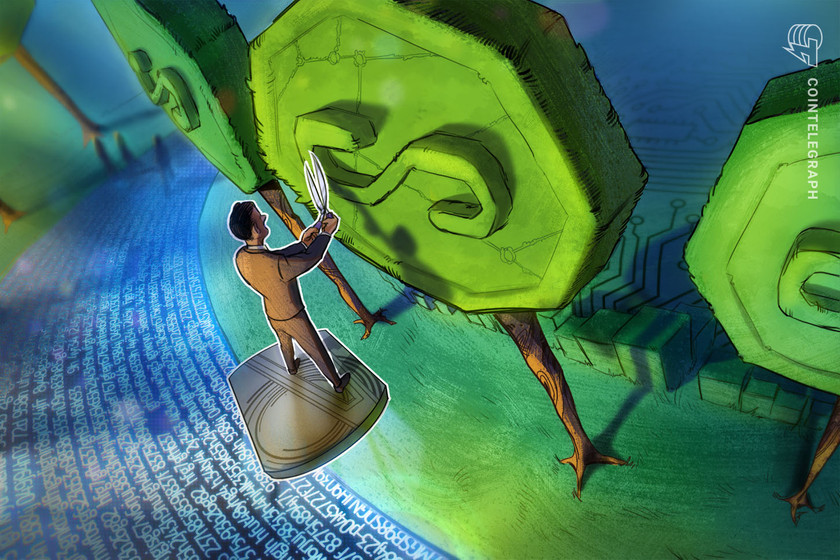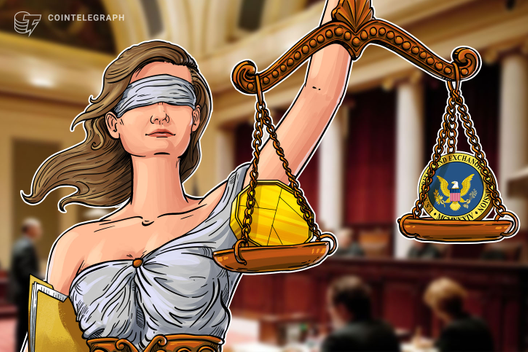In an exclusive interview with Cointelegraph, Crypto Valley Association President Daniel Haudenschild said that central bank digital currencies are “the next logical stage.”
Haudenschild explained to Cointelegraph that he believes CBDCs are the next stage “in evolution for decentralized finance.” He also claimed that there are currently 34 CBDC projects. According to him, such digital currencies represent a new era of governments and traditional finance that recognize the potential of digital assets.
Central banks innovate to avoid being left behind
Fear of being left behind, Haudenschild admitted, is a major force driving countries to innovate, “Undoubtedly, the drive of digital asset adoption has spurred governments into action; maintaining monetary sovereignty in the age of financial digitization is clearly a priority.”
However, Haudenschild’s stance is contrasting with an opinion expressed by conservative United States think tank, Heritage Foundation. In a recent report, it claims that regulators do not need to ensure that sovereign currencies stay at the center of each nation’s financial system:
“Government officials should not suppress alternative forms of money to protect sovereign currencies; they should protect people’s ability to decide what forms of money are the best means of payment.”
Haudenschild said that China — a nation that is close to completing its digital currency — is not the only one working on a CBDC. He mentioned the joint digital currency research conducted by the central banks of Canada, the United Kingdom, Japan, European Union, Sweden and Switzerland as an example of development on this front, concluding:
“While it is impossible to say when the first CBDC will launch, what is certain is that a race for innovation, coupled with a desire to meet growing demands for globalized finance, international remittances, and decentralized trust is driving each central bank forward in this mission.”
Overall, Haudenschild noted that central banks are seemingly reacting to the public’s growing demand for the benefits of decentralization. Still, he believes that the real competition in this race for innovation is not one between countries and their economies:
“The real challenger will be coins issued by enterprises and organizations to challenge the CBDCs. Libra is one such example. Other private stable coins such as USDT are already seeing very high trading volumes.”
Haudenschild believes private entities can challenge the sovereignty of central banks by offering more favorable exchange rates between currencies than those set by monetary policies. “The race is on, and central banks are not staffed nor set up to be innovative entities,” he said.
Talking further about Facebook’s Libra, Haudenschild said that there is still potential for the project to be successful, but this is largely dependent on the firm’s ability to talk with regulators. Still, he also pointed out that Libra is no the only such project:
“Let’s not forget that while Libra has been put on the global stage due to its ties to Facebook, there are millions of projects proposing legitimate payments solutions and alternative digital currencies that are also awaiting answers from regulators.”
CBDCs solve many of the struggles with physical currency
Haudenschild pointed to the many problems with physical money. He said that currently, central banks “produce low-value paper items (banknotes) which need to be tracked indefinitely by individual serial number.”
Furthermore, Haudenschild said that there’s a high degree of forgery, and the necessary antiforgery mechanisms are very expensive to implement. Lastly, inventory management is particularly costly because of the high security requirements. He then pointed out to CBDCs as a potential solution:
“CBDCs are a logical evolution in response to these and other challenges. With a CBDC, a central bank almost eliminates the cost per banknote (token), in a process that is almost impossible to forge, with little to no security overhead for the material management of the tokens themselves. Additionally CBDCs address shortfalls in traditional finance, from high international remittance costs, to corruption and underground economies.”
Haudenschild also pointed to the Belt and Road Initiative as an example of infrastructure which would greatly benefit from a digital currency. The BRI is a Chinese government project aiming to enhance commerce in Eurasia and parts of Africa and South America. He explained that “such payment infrastructure would eliminate bribes, corruption, pilferage, and other loss events along the entire supply chain.”
Sanctions do not work in the post-Bitcoin world
When asked to express his point of view on the relationship between digital currencies and sanctions, Haudenschild admitted that such tools allow to circumvent such economic barriers. He said that “sanctions restrict the flow of currencies only if the traditional settlement mechanisms are used, adding:
“If alternative settlement mechanisms are used, such as Bitcoin, or a USD backed cryptocurrencies, sanctioned countries can bypass their effects. The sanctions only function […] for those who play by the rules.”
Haudenschild explained that permissionless networks and cryptocurrencies like Bitcoin’s “will play a critical role in the future of the financial system,” acknowledging that cryptocurrencies eliminate the individual’s dependency on the banking system and guarantees financial freedom that cannot be taken away.
While the next Bank of England governor, Andrew Bailey, recently said that Bitcoin “hasn’t caught on much,” and that people investing in it should be prepared to lose all their money, Haudenschild expressed a much more positive opinion on the oldest cryptocurrency. In fact, he argued that Bitcoin is already mainstream:
“Arguably BTC is already mainstream, as it is the most known and traded cryptocurrency and has been since its inception. BTC does not have to be used as a transaction medium in daily purchases to be mainstream. It serves a different purpose.”
Regulatory action on crypto will increase
According to Haudenschild, within a year, governments will increase their activity related to crypto regulation and start to act quicker when necessary. He believes that issues that need to be solved quickly are banking for crypto projects and the classification of securities.
Haudenschild also expects a “huge expansion in governments bringing regulatory solutions to the table.” Still, he also pointed out a worrying trend in the actions undertaken by regulators like the Financial Action Task Force, which he believes “are being used as tools to slow cryptocurrency adoption.” He explained:
“Recently, we saw representatives from G-20 financial institutions urge countries to stay in line with global cryptocurrency standards from the FATF — regulations which are relatively harsh. The FATF’s Travel Rule was called out quite vocally as just such an action. This has the ability to significantly undermine the trust in these institutions to regulate global commerce and is inherently very dangerous.”
Cryptocurrencies help combat crime
An interesting and relatively unpopular stance expressed by Haudenschild is that, “cryptocurrencies make it easier for authorities to tackle crime.” According to him, the amount of negative attention that cryptos have received as tools for criminals is disproportionate to the actual nefarious activity that involves them:
“Cryptocurrencies make it easier for authorities to tackle crime. They are perhaps one of the greatest tools ever created to fight financial crime. […] Currently the amount of money laundering that happens in fiat, with normal banking institutions, far outweighs that in BTC, ETH, or all other cryptocurrencies combined.”
Haudenschild’s opinion goes against those expressed by many high ranking officials from major financial regulatory bodies all around the world. For instance, in December 2019, a member of the U.S. Federal Reserve’s board of governors said that one-fourth of Bitcoin users are criminals and half of all Bitcoin transactions are associated with illegal activity. Furthermore, Treasury Secretary Steven Mnuchin explicitly said that cash is not laundered as much as Bitcoin in July 2019.
Related: Presumed Guilty: Financial Watchdogs See Crypto as Illicit by Default
Haudenschild believes that central oversight is “the harbinger of dystopian control” and strikes against the principles that guided Bitcoin creator Satoshi Nakamoto. He suggests that the focus should shift to making clear regulatory frameworks that are compatible in different jurisdictions. Such an approach would allow for more blockchain adoption and increase financial transparency. He concluded:
“Trying to centralize control on a permissionless, decentralized trust-free mechanism is like trying to hold back the sea. A much better approach is to create clear guidelines and rules of play, and let the participants work within a structured and aligned framework.”









